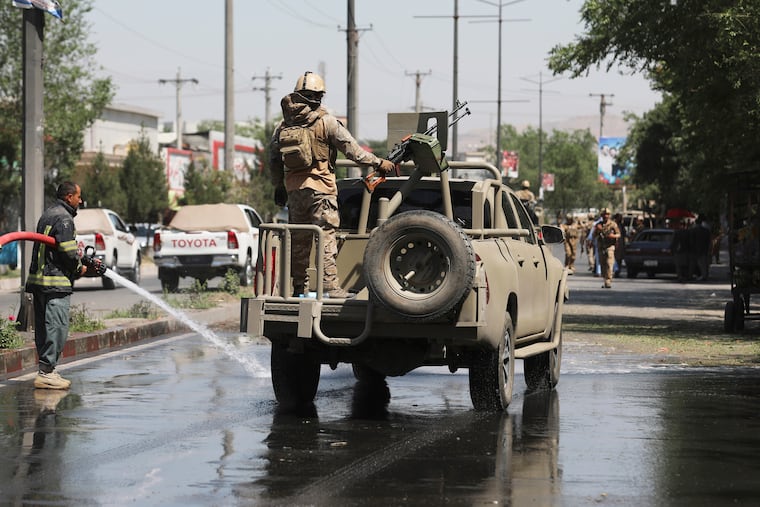U.S. exit from Afghanistan spells doom for translators, unless Biden steps in | Trudy Rubin
Thousands of Afghan translators for the U.S. military are under death threat from the Taliban and must be rescued before U.S. troops leave.

The pleas from Afghan interpreters under Taliban death threat because they worked for the U.S. military are growing increasingly desperate — as the last U.S. troops aim to exit before mid-July.
Volunteer organizations report a flood of emails from former interpreters begging for help because they have been warned the Taliban will kill them. There are approximately 18,000 requests in the queue for special immigrant visas (known as SIVs) that were promised by Congress to those who helped our military.
But those visas take months or years of bureaucratic checks to be processed, and no more than a small fraction of them can be issued before U.S. troops leave.
Yet, there is still no concrete military plan for an emergency evacuation for Afghans who helped Americans — and no order to do so from President Joe Biden. That order needs to come now.
» READ MORE: ‘Don’t give up on us.’ Afghan girls and women in grave danger when U.S. troops leave | Trudy Rubin
The panic by former translators echoes the growing fears of Afghans across the country as the reality sinks in that the last U.S. troops are really leaving. Until recently, there remained only 2,500 or so U.S. troops and several thousand contractors, but they provided critical air support and maintenance for Afghan forces. Their exit is a huge psychological blow as the Taliban continue to make gains.
I am hearing from educated Afghan women and professionals that they are desperate to leave, although few countries will grant them visas. They fear a coming civil war and a Taliban takeover in the coming months. One Kabul businesswoman told me: “I am waiting for the truck to hit me, and the only question is how badly I’ll be wounded or whether I will die.”
But perhaps the most terrified are former translators who have a bull’s-eye on their backs. Like other volunteer organizations that are trying to help the translators, No One Left Behind has received thousands of email pleas like the one from Khalid in Ghazni province: “I am under an ongoing threat and am receiving warning letters, phone calls, and messages through my relatives. My cousin’s friend was shot instead of me as he was driving same car as me and had come to our gate …”
Khalid scoffs at the message on the Taliban website that Afghan interpreters will be forgiven if they repent. “It’s clear that they are not changed from the time they were ruling all over Afghanistan and were hanging people, cutting their hands and feet and many more violences,” he writes. “Don’t be fooled of their fake promises, and save our lives.”
Many senior U.S. military brass are eager to get the interpreters out, by evacuation if need be. But there still is no concrete plan from the Defense Department.
» READ MORE: White House must authorize evacuation of Afghans who helped Americans before it is too late | Trudy Rubin
In late May, Joint Chiefs of Staff chairman Gen. Mark Milley told Defense One plans were being developed “very, very rapidly here, for not just the interpreters but a lot of other people that have worked with the United States.” But Milley’s spokesman, Army Col. David Butler, quickly walked back any speculation that there would be an airlift out for interpreters to a third country (as there was when around 120,000 South Vietnamese who worked with Americans were flown out as the U.S. left Vietnam).
“An airlift is not imminent,” said Butler.
I asked Pentagon press secretary John Kirby by phone whether there was any concrete plan on the shelf for getting the interpreters out if things got very dicey. “It’s more in the thinking and planning stages,” he responded. Who would have to task the DOD to plan an airlift? “That would be a policy decision by the White House, the commander in chief.”
But, of course, U.S. troops will be out in around four weeks. And a large-scale evacuation will be almost impossible once those troops all leave.
The heart of the problem seems to be that while DOD and the military are willing, the State Department does not think the SIVs problem is so urgent, timewise. And the State Department, not DOD, is in charge of the process of granting SIVs to Afghans. Moreover, no DOD plan for an evacuation will be activated unless the order comes from President Biden. And there’s no sign that’s coming soon.
Testifying before the House Foreign Affairs Committee on Monday, Secretary of State Antony Blinken focused on speeding up the processing of SIVs by adding 50 personnel in D.C. Blinken has shown a long-standing concern on this issue, but the convoluted visa process will take many months, if not years to clear the current backlog. Many translators may be killed long before then.
That’s why there is bipartisan support in Congress to airlift translators out now. Rep. Seth Moulton (D., Mass.), a Marine Corps veteran who served in Iraq, has organized the bipartisan Honoring our Promises Working Group, which has urged President Biden to consider a temporary evacuation of interpreters to Guam while their visas are processed.
The British, Germans, and Italians are evacuating their interpreters, so surely our country has equal loyalty to those who helped us.
“We made them a promise,” says Moulton. “We know they’re risking their lives for us, and we have their back. That’s America, we don’t leave anyone behind. If they [the administration] can’t do this before the troops leave, they should stay until it’s done.”